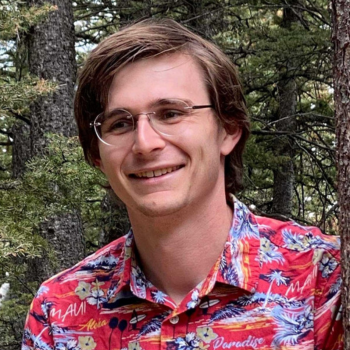
The unstructured symphony of grad school
Embracing challenges in academia and jazz
My first solo
Over the past 4 years at MIT, I have often had my comfort zone pushed. To name a few things, I’ve presented to NASA leadership, received my first peer reviews, and traveled alone to conferences. But one very different anxiety-o-meter peaking experience occurred about 40 seconds into the hard bop standard Nutville (à la the Horace Silver Quintet). You see, I had been drifting about academically in those doldrums between finishing my Master’s thesis and writing my PhD proposal. I had some time to spare and thought I’d try out for the MIT Jazz Band. Before I knew it, I was sweating in the basement of building 24 at 7:30 PM on a Monday. I’d just barely held on as we read through the head (the only part of a jazz piece where the melody is written down in sheet music), and the saxophone player next to me had just finished somehow crafting a solo out of the melodic turbulence running by at 300 beats per minute. Now the piano player was giving me “the look” which meant it was time for me to take my solo. Uh oh.
It’s important to note that I had never played in a jazz band before. I had been part of various community bands, marching bands, and concert bands throughout my life since picking up the saxophone in 6th grade, but this was my first foray into jazz. At 25 years old, I somehow believed I could effortlessly embrace this new art form. Let’s just say my initial attempts at soloing were, well, not great. I’ll spare you the painful details; your imagination can’t be worse than the reality.
Over the past year, my understanding of jazz theory has deepened, and my ear for melodic progression has improved. However, I’ve also come to see my weekly struggles in the jazz ensemble as a reflection of my overall experience at MIT. Being a graduate student here is far from easy. While you make friends, attend remarkable classes, and benefit from the guidance of brilliant minds, MIT at its core is a journey of growth–and growth often comes with growing pains. For me, the key to staying sane has been embracing discomfort, whether in the jazz ensemble or the laboratory.
Science and music
Scientists and musicians have a longstanding tradition of drawing parallels between their respective domains. Popularizers of quantum string theory readily turn to the guitar for analogies. People in ancient Greece linked the regular motion of celestial bodies to musical rhythms and tones. Sonification, the conversion of non-sound data into sound, remains a favored method for interpreting complex, time-varying signals, such as Earth’s Aurora radio waves or black hole mergers.
Of course, we expect some parallels between vibrating systems in science and music; after all, the same wave equations that govern quantum mechanics can be applied to guitar strings and trumpet tubes. However, the number of musically inclined students I meet in the MIT grad program is surprising beyond what can be explained by the mere commonality of equations. I argue that MIT swarms with musicians because music holds so many parallels to life outside of the practice room.
The trouble for me, however, is that my time in the practice room up until this last year had mostly been classical pieces, all Clementi Sonatinas and Ferling’s 48 Famous Studies. Any ventures into jazz were within the context of a concert band, comfortably guided by written-out arrangements for standards like “In the Mood” or “Pennsylvania 6-5000.”
Grad school is not like classical music
Classical music, for me, is comfortable. The chords and melodies progress logically and predictably, with all the notes written out for you. The beauty of classical music will always be in the nuances of human performance and emotion, but you can get a solid B- or so just by reproducing what’s on the page with mechanical precision. Undergrad study is like this; you take the classes, you memorize the content, cover the material in the textbook, and at the end of the day, you’ve gotten a nice neat education. The same symphony of content can be heard from halls of the lecture and concert variety all over the country.
I’m here to tell you, that grad school is not classical music, grad school is not structured and predetermined.
To deal with this, I’ve recently found myself applying coping skills from the world of music to my research endeavors. The same affirmations I use to “put on my game face” for a jazz solo have become invaluable in my research, and vice versa.
Surviving and thriving under uncertainty
Research and graduate study do not follow clear paths; there are no written instructions. Merely following a formula or procedure won’t guarantee success. Sometimes–just like when the drummer switches to a double-time feel in the middle of a piece–a research collaborator leaves or funding dries up, and you have to change on the fly. Often, you’re forced to act before having any idea where your efforts will lead. But that doesn’t mean you shouldn’t start.
When I was writing my Master’s thesis, still holding onto the last scraps of perfectionism I acquired in undergrad, my advisor gave me a piece of advice I can’t stop turning over in my head: “A done thesis is better than a perfect thesis.” Now on Monday nights, I take a deep breath, remind myself that a done jazz solo is better than a perfect jazz solo, and jump in; there’s no other way to know what you can create.
Me with my 2023/2024 Jazz Ensemble (and a little bit of my saxophone).
Share this post:
